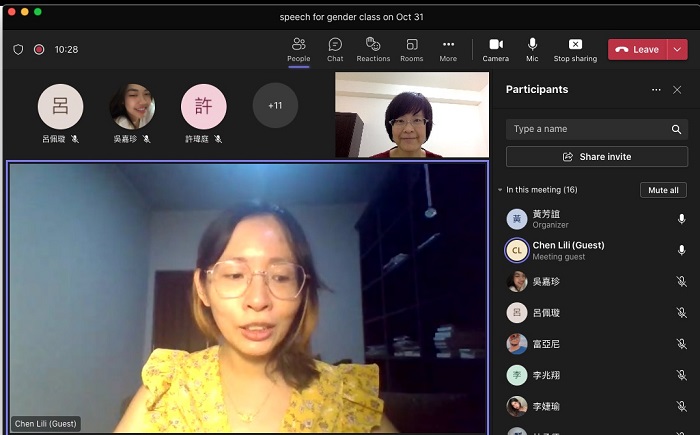The Department of Social and Policy Sciences of YZU invited Assistant Professor Lili Chen of the Department of Political Science and UNESCO Researcher of the National University of Timor-Leste (Universidade Nacional de Timor-Leste) to give six online lectures as part of a cooperative program.
As a result of taking this course, students will be exposed to an international perspective, participate in academic exchanges about gender and medical sociology between Taiwan and East Timor, and gain a comprehensive understanding of UNESCO's activities in the field of gender equality and health promotion in Southeast Asian countries, including Timor-Leste. They will also better understand the social policy and typological sociology in Southeast Asian countries.
The results for 2022 are as follows:
Online Lectures
| Date | Topic | No. of Participant |
| 2022/09/29 | An overview of related measures in Timor-Leste, such as the National Basic Health Insurance and the COVID-19 prevention program | 44 |
| 2022/10/03 | Gender Inequality in Timor-Leste: A Survey | 22 |
| 2022/10/06 | A review of Timor-Leste's national health care system and its challenges | 45 |
| 2022/10/31 | Health inequalities in Timor-Leste: An analysis of social security policy implementation | 30 |
| 2022/11/14 | Timor-Leste's Social Security Policy Implementation: A Gender Perspective | 18 |
| 2022/12/05 | Policy Implementation in COVID-19: A Gender Perspective | 13 |

Prof. Ryozo Matsuda, Director of the Department of Community Health and Health Policy at Ritsumeikan University, Japan, Researcher Kyoko Suzuki of The Japan Institute for Labour Policy and Training, and Prof. Jing-Wei He, Deputy Head of the Department of Asian and Policy Studies, Education University of Hong Kong were invited to deliver four online speeches as part of the school's social policy analysis topic (three credits), social policy analysis (three credits), and thesis writing and guidance classes.
Students must complete an achievement evaluation form for each East Asian social policy workshop. The evaluation requires three components: writing and explaining more than ten professional concepts and terms proposed by the speaker (to improve reading and writing), summarizing the key points of the speaker organized into 400 words (to improve reading, thinking, and essay), and listing the students' questions to the speaker, the speaker's answers, and students' self-reflection and criticism to organize and write 300 words (to improve the ability to speak, think, and essay).
The results for 2022 are as follows:
Online Lectures
| Date | Topic | No. of Participant |
| 2022/11/07 | The Employment System in Japan: Gender Differences | 30 |
| 2022/11/24 | An Overview of Hong Kong's Health Policy and Change | 40 |
| 2022/12/28 | The social and political response to COVID-19 in Japan: Does gender matter? | 14 |
| 2022/12/01 | Reforms in Chinese health policy promoted by scholars and think tanks | 37 |

 en
en  繁
繁